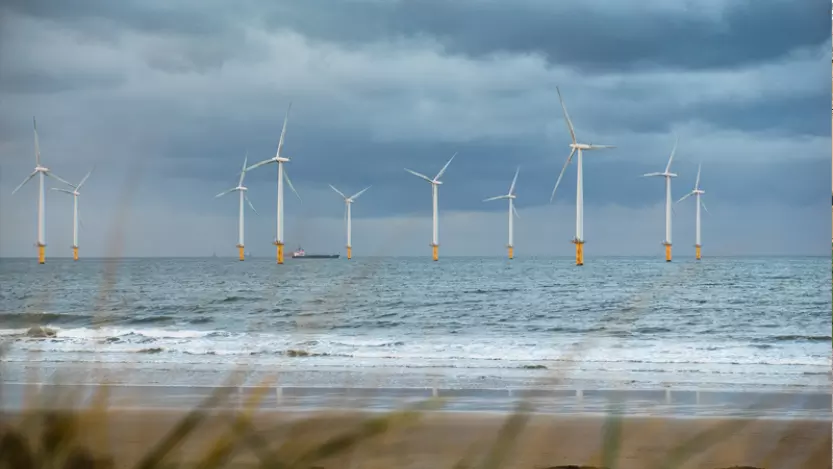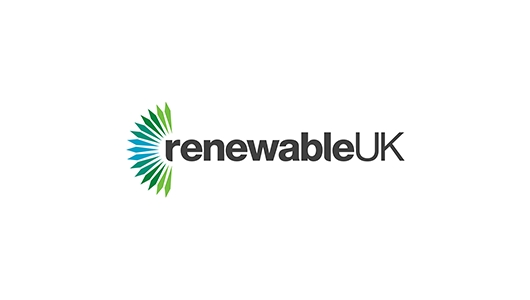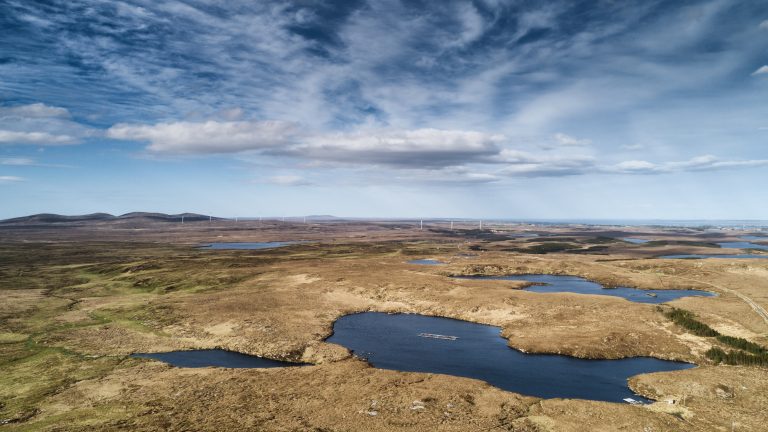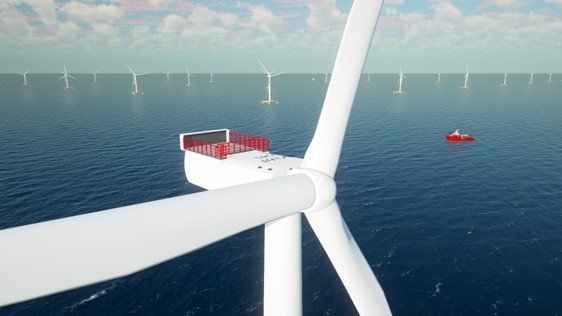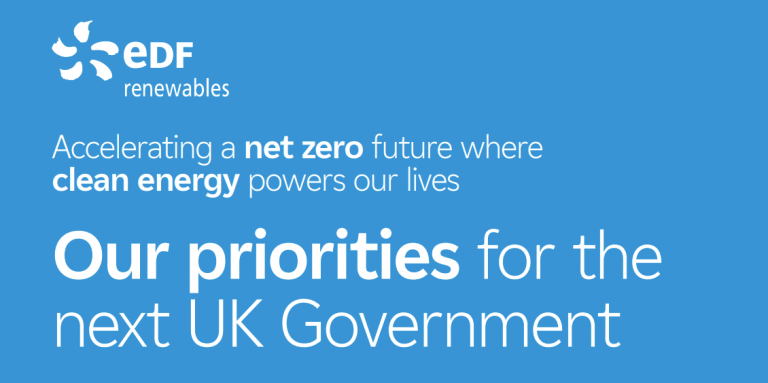
Dr Nancy McLean had a very successful career as a lecturer at Edinburgh University… Until she decided to give it all up and move to rural Dumfries and Galloway for a job in the nascent renewables industry.
It’s a move she’s never regretted and, even after 19 years in the sector, she still finds “utterly stimulating”. Read on to find out why working in offshore wind gives Nancy such a buzz. And what her advice is to anyone else – especially women – who might be interested in a career in renewables.
Day-to-day working life in renewables
Q. Where are you right now?
A. I’m in at home, which is in a little village about 12 miles outside Stirling. Usually I’d be commuting to our office in Edinburgh or travelling down to London for meetings between Tuesday and Thursday each week. I’ve always worked from home on Mondays and Fridays while at EDF Renewables; but obviously during the pandemic, I’ve been working from home every day.
I miss the office and face-to-face contact. I didn’t realise until lockdown that I’m such an extrovert; I like to think with my mouth open and in active discussion with my colleagues!
Q. What does your job as Senior Offshore Development Manager involve?
A. I co-ordinate the external and internal consultancy work required to put together our offshore wind tenders So my team decides where to locate our projects, how we build and connect these to the grid, and so on.
It’s proper multi-disciplinary stuff, as I work with a diverse range of nice folk: from engineers and consent managers, to technical people and scientists who understand what’s required to build turbines out at sea.
I also work on national strategy development with industry groups – such as Scottish Renewables and RenewableUK – to consider how we can best deliver offshore wind as an industry.
Q. What’s a typical day like?
A. When I’m working from home, I try to start by 8.30, and I work through until 5.30-6pm – pausing for a break at lunchtime for a dog walk. Before the Covid pandemic, I’d spend most of my time in face-to-face meetings – in Edinburgh, or London with the senior executive team. Now that’s moved onto Teams and calls.
It can be stressful, as I also need time to review or write documentation. But my job is so diverse that I’m learning all the time. I find it utterly stimulating: I could be talking to someone from government one minute, then a member of my team the next, or colleagues within EDF who work in completely different disciplines.
Developing a career in the renewables industry
Q. What was your route into the renewables industry?
A. In my previous life, I was a university lecturer at Edinburgh in biochemistry. So I went down the degree, PhD, post-doctorate studies and lectureship route. It was a busy job – I was lecturing and running small group tutorials – so there wasn’t much of a work/life balance. I also spent a lot of time in the lab, on my own, conducting experiments on bits of plant tissue – and I realised I missed interactions with other people.
My husband and I knew the directors of a renewables consultancy, called Natural Power, based in Dumfries and Galloway. We’d always wanted to give living in this rural area a bash – it has amazing mountain biking! – and I’d get to spend more time working in a team with other people. So we made the leap to Natural Power: my husband headed up the IT team and I became a consent manager for onshore and offshore wind farms.
Q. Were you worried about changing career path?
A. It was such a total change that no-one at Edinburgh University believed me when I first said I was leaving! But I have always striven for intellectual challenge and stimulation; to enjoy my job and feel like I am making a difference to society and, latterly, the climate change emergency.
I worked at Natural Power for 16 years and it gave me a good grounding in developing onshore and offshore wind farm projects. In 2018, I joined EDF Renewables to focus on project delivery. One of the aspects I particularly like about working for EDF Renewables is having access to expertise within EDF about the grid-side and how you deliver electricity to end users too – along with my engineering colleagues in both the UK and Paris. This level of understanding brings a whole new depth to my role when I’m deciding where to cite projects and how to deliver power to homes.
Q. What is your motivation for working in the renewables industry?
A. I genuinely want to save the world and make a difference to my carbon footprint. If we think about the Net Zero target: this means we need 75–100 GW of offshore by 2050. But I’m excited about all the things that we need to do to reach Net Zero – not just developing offshore wind, but having an electric car network with batteries, developing a hydrogen economy, and so on.
Diversity and inclusion within the renewables sector
Q. Do you think the industry could do more to promote diversity and inclusion?
A. I’m really conscious of the fact that women are under-represented in the industry – especially in offshore wind. The signatories of the offshore wind Sector Deal have committed the sector to increasing the representation of women in the workforce to 40% by 2030. In 2019, it was 16%, so we have a massive hill to climb.
It’s why I always make an effort to wear a frock – and I make sure that it’s flowery if I can – whenever I go to a face-to-face meeting. I want to send out a message to everyone that you can be a flowery frock-wearing woman in this industry!
But part of it is also making the work environment flexible. I’ve chosen not to have children; but those who do might not want to work five days a week. Yet their contribution is so valuable and we need a diverse workforce because different people working together come up with better ideas. A diverse group of colleagues working as a highly functioning team is definitely stronger than the sum of its parts.
So I’ve tried to create a diverse environment in my team that works for people – not just women, but anyone who wants to work from home; or work fewer hours; or work around school pick-up and drop-off times. It’s a relationship based on trust – I know my team are committed to delivering on projects and will put in the hours to make it work.
Q. What would you say to a young person if they were interested in a career in renewables?
A. Just do it. It’s a fast-moving sector that, while maturing, is still developing and growing. There will be the need for proactive and driven individuals with ideas and drive to help the industry fulfil its potential and contribute to the UK’s Net Zero ambitions.
Love what you do; do what you love
Q. What do you enjoy about working in the offshore sector?
A. I like onshore wind because people can see where their electricity comes from. And I think that is really important. But I love offshore because of the scale. Offshore wind farms are much bigger; produce far more electricity; and, therefore, make a huge difference to the reduction of carbon footprint of our energy mix.
Offshore wind projects just keep on getting bigger too! My first onshore project that I managed the consent for was a 24 MW site. But future offshore wind farms will have turbines that alone can generate at least 18 MW… So sites will be able to produce a lot more electricity.
Q. What’s your favourite part of your job?
A. I love that every day is like a school day. It’s always mentally challenging and stimulating – and that’s what I really like about my job. I love interacting with a huge variety of people every day – not only different skills sets, but also age and experience. It’s a very stimulating environment.
Q. And what’s your least favourite?
A. My least favourite is following set procedures and making sure everything is documented. I know you have to follow the rules and record everything appropriately – but I also know this is my weakness. So I surround myself with people who are good at this, to make sure it gets done. That is part of the rationale for ensuring we have a fully diverse team – our skill sets completement each other rather than overlap, making us greater than the sum of our constituent parts.
Q. Looking back on your career, would you have done anything differently if you could?
A. No, I don’t think so. I have always grasped opportunities that present themselves, rather than had a definite career plan in mind. And, if I had done things differently, I am sure I would have been presented with different opportunities.
I like where I am right now: with the work life balance I have now (although I have to fight for it, as exciting jobs always have the potential to take over your life!), and working with the colleagues that I have right now. I am looking forward to more growth and development in the future.
Q. Is there anything you’ve not done yet in your career that you’d like to achieve?
A. I would really like to be a Project Director for an offshore wind farm. I’d like to take the project from exclusivity award through to the development of a viable project –within the physical and environmental conditions of the site – onto to the consenting phase and developing a route to market… and finally to the Financial Investment Decision (FID). That would be absolutely fantastic.
Future developments in wind power
Q. What do you see for the future of wind power?
A. We all know now that we’re going to need floating offshore wind at scale. At the moment, the industry is talking about it and there have been some 50 MW scale projects. But if we’re to hit the Government’s Net Zero targets, we need large-scale floating offshore. And along with this is a need for innovation in hydrogen and batteries, so we can balance the grid system. The whole area is really exciting as there are so many possibilities for the future.


